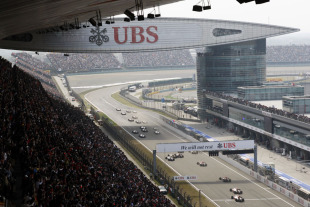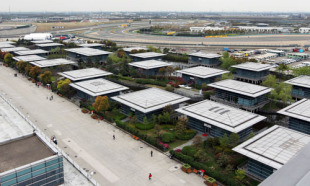- Maurice Hamilton's Formula One blog
A quick Chinese: not particularly satisfying
Maurice Hamilton April 10, 2012
- Race:
- Chinese Grand Prix
First visit to Shanghai, you are engaged and enthralled by the madness of a city then never seems to sleep; a place that goes flat out from dawn to dusk, and through to dawn again. Pulling the bedroom blinds upon retiring, you will see sparks from welding torches contributing to the twinkling city lights in the inky blackness. When you open the curtains in daylight, another floor seems to have been added since you last looked at the tower block under construction across the road.
Standing on the kerbside is mind-boggling entertainment. The air is filled with peeping horns as traffic constantly changes lane with alarming but precise accuracy. A gentle toot or two on the horn is not a signal of indignation; it's a warning that you are coming through - like it or not.
The system works. Despite what seems a near-death experience, there are surprisingly few collisions. Every driver is 100% alert, active and exact as a result. Try this in London - assuming the traffic is moving - and you'll get lynched at the next red light for having the audacity to blow your horn and change lanes. It adds to the impression that Shanghai crackles with energy.
You would think, therefore, that a grand prix would be a perfect fit for this automotive urgency. Sadly not. The experience begins to wilt in the smog as you bounce along the uneven roads away from the city and into the grey suburbs where, perhaps appropriately, the Shanghai International Circuit has been built on former marshland.
It is a massively impressive structure but the bits that matters - the race track and the people who should energise the place - fall way short of what's required. Having invested in the project and captured the world's attention through the lens of a television camera to earn international credibility, it's as if the government has moved on to something else. Okay; got a grand prix; tick that box.
The most insistent activity, certainly during the two days of practice, often takes place outside the circuit where free enterprise reigns. Alight from your car (handled by a local driver who copes with the traffic because it's second nature) and a tide of little people appear from nowhere brandishing watches and binoculars. Clearly with the latter, they've got wind of a race track which is some distance away from the people paying to watch. This is a modern facility, quick in parts, that happens to have racing cars running round it.
Okay, so the buildings with their massive arches across the track look imposing (you could hold a football match in the media centre spanning the start of the main straight) but the designer's artistic licence is completely misplaced in a paddock devoid of atmosphere.
Each team has an office on an individual island in a man-made lake. The area is known as a place of 'peace and meditation', a misnomer if ever there was one given the constant bitching and plotting going on behind closed doors. This, for example, was where Fernando Alonso in 2007 punched an office door off its hinges as a demonstration against a perceived injustice by McLaren as he qualified fourth to team-mate Lewis Hamilton's pole.
Interesting and different these offices may be but, by their very nature, the fortress islands have destroyed the sense of community found in the European paddocks where the teams are parked in close company. Then again, the term 'community' was being stretched to the limit during that tense weekend when the 2007 championship was reaching its climax at what was then the penultimate round in Shanghai.

Hamilton, not realising the gravity of the situation from a media point of view, looked on in amazement when a British journalist sprang to his feet, shouting 'That's bang out of order, that is, mate!' before berating the Italian in no uncertain terms and demanding that he wipe his recorder clean. Claims of feigned innocence by his European colleague cut no ice with the man from the News of the World as the temperature in the room rose dramatically. If the Italian had passed the interview on to an agency in Europe, the exclusive nature of the words from a British media point of view would have been made worthless. Hamilton looked stunned and did not utter a word while all hell broke loose around the British contender for the title.
Lewis was learning first hand that F1 competitiveness goes beyond activity on the race track. Even in a place as bland as this.
Maurice Hamilton writes for ESPN F1 in the build-up to each Grand Prix.
© ESPN Sports Media Ltd.
 Maurice Hamilton writes for ESPN F1. A veteran journalist in the paddock, Maurice Hamilton has been part of the Formula One scene since 1977 and was the Observer's motor racing correspondent for 20 years. He has written several books as well as commentating on Formula One for BBC Radio 5 Live
Maurice Hamilton writes for ESPN F1. A veteran journalist in the paddock, Maurice Hamilton has been part of the Formula One scene since 1977 and was the Observer's motor racing correspondent for 20 years. He has written several books as well as commentating on Formula One for BBC Radio 5 Live

